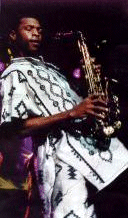 NgEX!Shopping
NgEX!Shopping
|
 Guides
Guides
|
 Channels
Channels
|
|

|
The victory in May this year of Femi Anikulapo Kuti as the best selling musician in Africa at the World Music Awards in Monaco is further confirmed of his ascendancy into the kingship of Afrobeat, an honour held by his father Fela until he died of AIDS related causeson August 2, 1997.
Femi has made a career not simply by playing the kind of music his world famous father played, but by giving it his own very style which is heavily steeped in the electric and funky style that appeals to a global audience.
|
First, he broke out from playing in his father's band to give Afrobeat a faster, high tempo beat, and then he introduced a heavy dose of rock beat to complement the rich horn section and heavy bass line.
|
He was born in 1962 as the second child of Fela's marriage to his wife Remi Taylor. Femi grew up in the middle of his father's music clan. He stopped going to school when his father removed him from a Lagos school to protest the drafting of soldiers to enforce discipline in schools. Having dropped out of school, Femi had only one thing on his mind and that was music. His ever feisty father however did not have time to teach him the rudiments of music. The young man was however undaunted and he taught himself the elementary lessons in music. His private lessons improved and after working on the vibraphone and saxophone he decided to stick with the latter.
|
He left his father's Egypt 80 band in 1986 and along with his two sisters Yeni and Sola as dancers, he formed his own band called the Positive Force. He started a regular Sunday Jump at his father's old African Shrine located in Ikeja, Lagos. He also got a lot of sit-in time at the Jazz 38 centre of his cousin and Jazz singer Fran Kuboye who along with her husband bassist Tunde Kuboye gave the 24 year old Femi a BABA award in recognition of his budding talents in 1986.
|
The beginning was very tough for Femi and his band. His decision to play a radically different Afrobeat from his father was not appreciated by many people who had been used to Fela's style of music. Fela remained the definitive voice of Afrobeat and any deviation from his pattern was seen as a taboo. People boycotted Femi's early shows and his recordings like "No Cause For Alarm", "Search Yourself" and "Mind Your Own Business" were market failures.
|
A major chapter was opened in the musician's life in 1995 with the release of the album "Plenty Nonsense". The hit song "Wonder Wonder" convinced sceptics of Femi's prowess. A blend of effective instrumentation and a good chorus line won him a lot of new followers. The album, launched under the label of Motourn effectively established him as a musician to watch .
By the time he released his latest album, Bang Bang, Bang in 1998 he had finally taken over the space created by the death of his father the previous year. The 10 track album became an instant hit and won a sea of fans at home and abroad. All the songs became radio hits but in a show of official recklessness the government owned National Broadcasting Commission (NBC) banned the title track "BANG BANG" from airplay claiming what its lyrics were offensive. Putting the politics at home behind him, Femi embarked on an aggressive global tour to promote the album which was christened "Shoki, Shoki, Shoki" for the international market. His travels have taken him to virtually all parts of the globe.
Femi is no stranger to winning awards. in 1996 he won six awards at the Fame Music Awards organised by the publishers of Fame Magazine for his album, Plenty Nonsense. Several others have since been given to him in Nigeria. The big icing on the cake was the double KORA Awards he won in South Africa on Saturday, 4 September, 1999 as the best male artist in West Africa and Africa. No other Nigerian, not even his father has won a KORA AWARD.
The World Music Award in Monaco, which he got for selling over 500,000 records, only means that the much covetted Grammy is only some songs away.
Go to top
|



